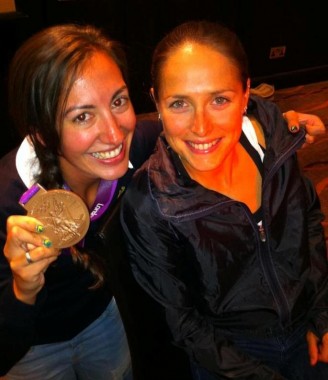“Most people think that long, steady state exercise is the key to endurance, however that’s not the case. The best way to improve endurance is to include interval training into your program. ” Institute of Sport coach Danielle Stefano.
Ever wondered what motivates triathletes to push themselves to the peak of endurance and train for five hours or more a day?
Our next Engaging Woman Danielle Stefano is here to shed some light.
She was one of the Australian team coaches at the London Olympics and is head triathlon coach at the VIS. The sports scientist has worked with some of the world’s best, forging a name for herself in a sometimes tricky, male-dominated environment. She knows intimately how to get the best out of people.
Martine: So Danielle can you give us some insights into the mind of the Victorian Institute of Sport triathletes? What sets them apart from the rest?
Danielle: I guess it is the level of commitment and dedication that they have to not only their training, but the lifestyle that is required to succeed at the very top. They have long, hard training hours (on average 6 hours a day) where they are pushed to their limits in all 3 disciplines; swim, ride and run. To be able to get up day in and day out and demand the most out of yourself all year around shows the internal drive that these elite triathletes have.
They are built tough, mentally and physically, to be able to endure two hours of smashing themselves against the best in the world to deliver truly world-class performances at elite races. In the eyes of elite triathletes, second place isn’t good enough. Whilst they appreciate a good performance, they want to win every time they stand on the start line and first place is their only option.
MH: Gosh heavy demands they place on themselves. What does a normal day entail?
DS: Very rarely do you have a normal day! The closest description of what is a ‘normal’ day would start off coaching on pool deck for about 1.5-2hrs, followed by a 2-3 hour bike ride, and then an hour run session.
In between training sessions, I have a number of meetings with the service providers that I have involved with my program (strength & conditioning coach, sport scientist, Physio/masseuse, dietician) to get updates on each athlete and give feedback on areas that I want them to focus or improve upon. Throw in some management meetings, admin paper work, programming and individual meetings with my athletes and that’s usually how my day looks!
MH: What is your best advice for us when it comes to improving our endurance?
DS: Most people think that long, steady state exercise is the key to endurance, however that’s not the case. The best way to improve endurance is to include interval training into your program. There’s many different interval combinations that you can use for varying levels of fitness, and it also helps make sessions more interesting which will increase the likelihood of actually sticking to your exercise regime long-term.
MH: What do you say to people who believe, “I could never be a triathlete or do anything like that?
DS: I say “stop making excuses!”
The great thing about triathlon is that there are heaps of beginner style races to ease you into the sport rather than going straight into Olympic distance racing. Start off with a short distance triathlon and build your way up as your performances improve. In training, make sure you can comfortably complete the required distances for the swim, ride and run to ensure your first triathlon experience is an enjoyable one!
Don’t bite off more than you can chew for your first race, and I guarantee you’ll be signing up for your next one in no time!
MH: Tell us about your journey – how did you get to where you are today?
DS: My path to where I am today definitely hasn’t been your orthodox journey into coaching. I started off as a Sport Science trainee at the Victorian Institute of Sport whilst I was undertaking my university degree in Human Movement. As a trainee, I worked with a number of different sports including talent identification, soccer, swimming and rowing. After 2 years as a trainee, I had a casual position as the talent search coordinator for our rowing program before successfully gaining full-time employment at the VIS as a sport scientist in 2007.
… I was one of the Australian team triathlon coaches at the 2012 London Olympics which was definitely an unbelievable experience!
MH: Who inspires you?
DS: This sounds really cliché but my athletes inspire me. I see what they produce when I push them in training, and their successes on race day, and I can’t help but want to strive further myself. The team environment that we have created inspires me to lead them all to success. In terms of coaching, I’ve been lucky enough to work with some of the best in Australia, let alone the world. One coach who I admire and look up to is Chris O’Brien.
Chris was the Head Rowing Coach at the VIS and has coached multiple Olympic medal crews. Not only am I inspired by Chris’s coaching knowledge, skill and success, but the way he deals with his athletes and connects with them is a great quality that he has. He also creates a ‘team around a team’ by gathering the best support staff and making them feel important and responsible in the process towards his athletes’ Olympic success… If I can run my program with the same amount of success whilst maintaining the level of integrity that Chris does, I’ll be extremely proud.
Danielle Stefano (left) with Erin Densham London Olympics
